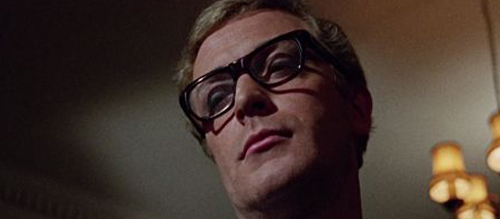Harry Palmer – The Thinking, Cooking Man’s James Bond
Harry Palmer, as played by Michael Caine in 1965’s The Ipcress File, is the thinking man’s James Bond. And that statement is not just to make a fellow bespectacled, lanky guy who cooks to relax feel a bit better about himself…
Even if you’ve never even seen any classified intel or thrown a punch at a shifty thug, Harry Palmer makes a much stronger and more genuine connection than his more famous, sexier cousin in espionage.
The Ipcress File can claim to be the only spy movie that introduces our hero not with an action scene or a briefing for his latest dangerous mission, but instead with him leisurely waking up at 8.00am and making freshly ground coffee. The world obviously doesn’t need saving too urgently, as he doesn’t even go in to work for another hour and 45 minutes!
The way Caine chose to play Palmer was a revelation. So much self-assurance and attitude in a slight frame, understated Buddy Holly swagger in those glasses. You’d best be keeping an eye on an agent like this because you’d underestimate him to your peril.
Deadpan Michael Caine is the best Michael Caine, responding to a promotion and pay rise with: “Oh thank you sir, now I can get that new infrared grill”. It was in this film that Caine established one of his go-to screen personas – the working-class smart-ass. He doesn’t come up with the perfect quip for the moment like 007 but he does have a sardonic wit and a straightforward take on the world.
Recommended for you: Every James Bond 007 Movie Ranked
It’s amazing now to think that the studio didn’t have much faith in this film’s box office potential because they thought audiences might think a hero who cooks was too effeminate or – perish the thought – actually gay. Once they’d decided to make it clear that Palmer was absolutely not gay, 60s film-goers could relax, but looking at the film with modern eyes the character might be seen as every bit as problematic as Bond in regards to his relationships with the opposite sex. He still seduces and sleeps with as many women as possible, but not primarily through the means of cheesy one-liners, but with cooking and cheesy one-liners.
Cinematographer Otto Heller constructs some lovely Noir-ish Dutch angles and looming shadows in and around the old British establishment buildings and the ruins of industry. Faces are often bisected or partially obscured to reflect plotting and duplicity, the same job served by Palmer’s iconic glasses. When Caine moves his head slightly, his eyes are obscured by light reflecting off the lenses or the shadows behind them, which I’m sure shots were carefully blocked to exploit. Palmer is reassessing the situation moment to moment and is not easily read. Everyone working in this world of secrets has some of their own and the film’s construction is reinforcing this constantly.
This world feels more worn and lived in. Rather than the shiny toys of Q Branch, this film’s spy quartermaster works out of what looks like a metalwork classroom in the back of a government building. Without gadgets and unlimited resources, these secret agents have to rely on their wits and their willingness to fight dirty. There’s no real glamour to this world of espionage either, as Palmer’s fellow spy Jock points out to his dismay at the amount of paperwork involved, “You’ll soon find out this job is all legwork”.
The film’s two biggest action scenes are a fist fight viewed through the other side of a telephone box and a POV shot of a Jeep driving through a warehouse door. Aside from a brief armed standoff in a multistory car park, that’s it for high-octane action and it’s so refreshing to rely on atmosphere and a slow tension build for your spy movie’s thrills.
By-the-by this discussion is reserved for Harry Palmer in The Ipcress File only – the sequels quickly became more Bond-like and less good. Here Palmer doesn’t leave London until he’s nabbed by enemy agents, in every subsequent film they picked a trendy city abroad for him to strut around. Things got a bit convoluted from the second film onwards – Funeral in Berlin had lots of identity-swapping, last-minute loyalty changes and counter-espionage between agents of at least four countries; the third Harry Palmer adventure The Billion Dollar Brain was even worse, bizarrely directed by none other than Ken Russell who seems to be losing interest even as he films. It just gets sillier and sillier, and Caine looks as jaded as Roger Moore did when he was playing Bond pushing 60, though Caine was only 33.
Harry Palmer, at least in his first screen outing, is a fascinating counterpoint to James Bond – a very different kind of spy to cheer for. Palmer’s feet are firmly rooted to the filthy London pavement and the fashionable new supermarkets he frequents for gourmet supplies just as Bond jets off to exotic locations and dines in the swankiest of restaurants. They both womanise, they both talk back to their superiors and kill in the name of their country, but only one can make you the best meal you’ve ever eaten.


